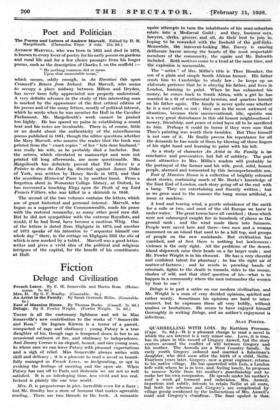Fiction
Deluge and Civilization
French Leave. By E. (E. Somerville and Martin Ross. (Heine- Mrs. D. By G. F. Bradby. (Constable. 6s.) An Artist in the Family. By Sarah Gertrude Millin. (Constable. tis.) East of Mansion House. By Thomas Burke. (Cassell. 78. 6d.)
Deluge. By S. Fowler Wright. (Fowler Wright. 7s. 6d.)
. , • - •
TRERE is all the customary lightness and wit in Miss Somerville's new contribution to the works of "Somerville and Ross." Sir Ingram Kirwen is a terror. of a parent,
.. • compacted of rage and obstinacy : young Patsey is a true
daughter of his, though rage is tempered down in her to an occasional outburst of fire, and obstinacy to independence. And Jimmy Corran is an elegant, honest, and nice young man, to whose care we can leave Patsey with pleasant expectations and a sigh. of. relief. Miss Somerville always writes with skill and delicacy ; it is a pleasure. to read a novel so beauti- fully managed as French Leave, • so invigorating, so apt in evoking the feelings of morning and the open air. When Patsey has run off -to Paris and Bohemia we are not so well satisfied. „ It is an. interloping time, less vivid and less real. Ireland is plainly the one true world. - - - Mrs. D. is preposterous in plot,•inciedible even for a farce'; but Mr. Bradby has a store. of humour that makes agreeable, reading, , • There are two threads to the book.. A romantic
squire attempts to turn the inhabitants of his semi-suburban estate into a Mediwiral Guild ; and they, business men,
. lawyers, clerks, grocers, and all do their best to join in
' hoping to be rewarded with the freehold of the golf -links. Meanwhile, the innocent-looking Mrs. Davey is causing deliberate havoc among the hearts of the most respectable members of the community, the squire and Mr. Bubwith included. Both motives come to a head at the same time, and the explosion is memorable. _
The " artist " of Mrs. Millin's title is Theo Bissaker; the son of a plain and simple South African farmer. His father sends him to 'Cambridge to study law, he keeps up an elaborate pretence that he is obeying his father, and lives in London, learning to paint. When he has exhausted his money, he comes back to South Africa, with a girl- he has married in a fit of sentimental heroism, and quarters himself on his father again. The family is never quite sure whether he is a real artist or not ; they are in the most awkward of situations, because their unconventional, idle, egoistic son is a very great disturbance in this old honest neighbourhood ; money, friendship, and peace of mind have all to be sacrificed to him. Perhaps it could be borne if they were sure that Theo's painting was worth their troubles. But Theo himself is not sure of it. He finally proves his repentance for all the demands he has made of them by blowing off three fingers of his right hand and learning to paint with his left.
As a study of character An Artist in the Family is in. conclusive and provocative, but full of subtlety. The part most attractive to Mrs. Millin's readers will probably be the portrayal of the farmer and his wife, good, solid, honest people, alarmed and tormented by this incomprehensible son.
East of Mansion House is a collection of brightly coloured short stories, containing much of Mr. Burke's knowledge of the East End of London, each story going off at the end with a bang. They are entertaining and fluently written ; but as we grow used to the manner the bang seems artificial, a tonus ex machina.
A loud and tearing wind, a gentle subsidence of the earth for a mile or two, and most of the old Europe we knew is under water. The great towns have all vanished ; those which were not submerged caught fire in hundreds of places as the ground sank ; and the wind made them into furnaces. People were saved here and there—two men and a woman marooned on an island that used to be a hill top, and groups of people on the new mainlands. But civiliiation has vanished, and at first there is nothing but lawlessness : violence is the only right. All the problems of the desert- island shipwreck raise their heads on a far larger scale ; and Mr. Fowler Wright is in his element. He has a very cheerful and confident talent for phantasy ; he has the right air cif matter-of-factness ; and he revels, in prowling bands of criminals, fights to the death in tunnels, rides to the rescue, clashes of will, and that chief question of his—what is to happen in a community where the men butnumber the women by four to one ?
Deluge is in part a satire on our modern civilization, and Mr. Wright is a man of very decided opinions, spirited and rather wordy. Sometimes his opinions are hard to inter- connect, but he expresses them all very boldly, without qualms or hesitations. He seems to have enjoyed himself thoroughly in writing Deluge, and an author's enjoyment is
ALAN PORTER.






































 Previous page
Previous page